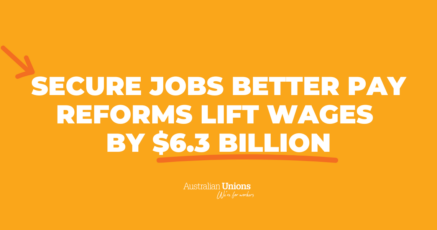The Morrison Government must stop dragging its feet on urgent reforms to protect vulnerable workers during the current COVID-19 crisis, and after.
There are now more than 2000 active cases of COVID-19 in Victoria, and a worrying outbreak in New South Wales. Last week, we wrote about why the Morrison Government needs to provide two weeks paid pandemic leave to everyone who needs a COVID-19 test or goes into quarantine. This issue hasn’t gone away. In fact, it’s even more urgent now.
There are serious fears for workers and residents in 35 aged care homes in Melbourne who are infected with COVID-19, and concerns that it will spread further. Aged care homes across the world have seen some of the worst effects of coronavirus. Earlier this year, 19 residents of Newmarch House in western Sydney died, after a worker with mild symptoms of COVID-19 worked at the aged care home for six days while infected.
Care workers are amongst the lowest paid in the Australian workforce. They are also key to containing the Victorian and NSW outbreaks. This week, the ABC spoke to casual workers in aged care and disability, who said they went to work with COVID-19 symptoms because they couldn’t afford to take time off without pay.
Aged care is a new frontline in Victoria’s fight against COVID-19, but other countries have already seen the what happens when governments do not provide inadequate protections to care homes and their workers. By mid-June, more than 16,000 people in UK care homes had died from coronavirus – almost third of the nation’s total fatalities. This was, in part, because of Boris Johnson’s government’s failure to address concerns raised by the sector in the first stages of the pandemic.
We need to make sure the government listens to the ACTU’s call for paid pandemic leave, immediately. Sign the petition for paid pandemic leave.
The government also needs to look to the future and guarantee a permanent increase to the JobSeeker payment. On Wednesday, the ACTU joined the Australian Council of Social Services (ACOSS) in a day of action to support permanently raising the rate of the JobSeeker payment. This means keeping JobSeeker at the current rate, inclusive of the coronavirus supplement introduced in March.
“JobSeeker isn’t just important during the pandemic – it is essential that people looking for work have time and security to find a job,” ACTU President Michele O’Neil said this week. “The $40 a day rate of NewStart was a poverty trap so low that it stopped people having the resources they needed to survive while looking for work.”
Right now, there are 13 workers unemployed for every available job. The crisis facing households is only growing. Research from the Australian National University showed that the percentage of Australians who cannot meet their regular housing costs rose from 6.9 per cent in April, to 13.1 per cent in May. With 1.7 million Australians expected to be unemployed in September, when JobKeeper and the coronavirus supplement are set to end, these numbers will only increase.
The old NewStart rate (now JobSeeker) was one of the lowest in the OECD. Earlier this year, a Senate Inquiry heard from people who skipped meals and medication, were driven to homeless, and whose mental health suffered because of the inadequacy of the NewStart payment. We cannot return to the old rate, when this is what it cost Australians.
A permanent increase to JobSeeker is also critical to Australia’s economic recovery. The Grattan Institute has found that JobSeeker payments insulated households from the worst impacts of COVID-19, and helped spending recover between April and June. It highlights a permanent increase to the rate as one of the reforms that will help secure the economy in the uncertain times that lie ahead.
You can still support the campaign to Raise the Rate For Good.





SHARE:
Two urgent reforms can protect vulnerable workers from the worst effects of COVID-19